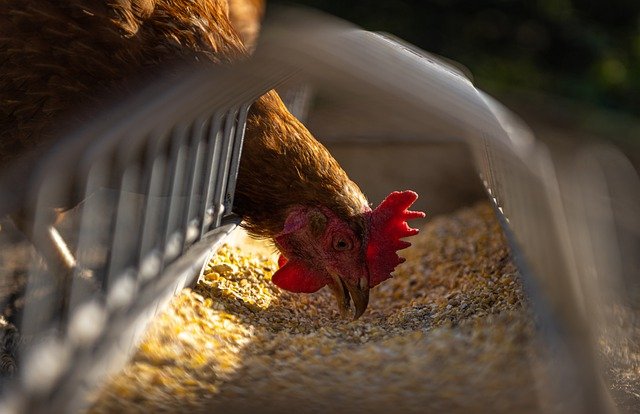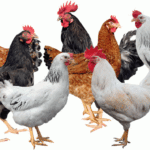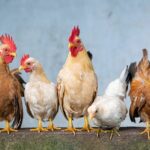Feeding takes the largest portion of expenses when rearing kienyeji chicken. In fact, feeding takes up to 80% of the kienyeji chicken rearing costs. For instance, you will spend around Ksh. 16,800 for chick mash and Ksh. 24,255 for the growers mash when taking care of 100 chickens.
Relying only on manufactured feed increases the cost of chicken farming. Furthermore, the more you rely on manufactured ready-made feeds, the higher the risk of buying low-quality feeds. Yet poor quality feeds slows chicken growth and lead to losses. This is because it lowers egg production, increases disease risks, and may even cause death.
- Making poultry feeds
- Ingredients
- The Pearson Square method
- Buying ingredients only without the need to make calculations
Making poultry feeds
Making your feeds to supplement ready-made bought feeds from the shops reduces the cost of chicken rearing. I said supplementing because you cannot also entirely rely on self-made feeds to rear chicken. This is so especially when rearing a huge number of Kienyeji chicken.
Ingredients
The raw materials for making your homemade chicken feeds are maize, cottonseed cake, soya beans, sunflower, and fish meal (omena). Some of these are very cheap, and easily or readily available. Then you need to spend a little amount of money on micro-nutrients, minerals, and vitamins. These will ensure a balanced diet. All of the ingredients are available from the agro veterinary shops near you.
Making your feeds saves in between 30 to 50 percent of costs for every 70kg bag of chicken feed. However, this depends on the location.
One trick to reducing the cost of these raw materials is collecting them during the harvesting season.
In addition to this, make sure to maintain the required amount of feeds for each category of chicken. That is:
| Category | Amount of feed per day/each chicken |
| Egg-laying chicken | 130-140g |
| Chicks | 60g |
| Pullets about to lay eggs | 60g for 2 and ½ months and then 140 g layer diets |
| Broilers | 67g |
The Pearson Square method
This method is used to formulate feeds. It dictates that digestible crude protein (DCP) is the basic nutritional requirement when preparing chicken or animal feeds. Adhering to this method requires knowing the quantity of crude protein content in each ingredient used to make feeds.
Here is the DCP content for the main ingredients you need in making low-cost chicken feeds at home.
| Ingredient | Percentage |
| Maize | 8.23% |
| Sunflower | 35% |
| Soya | 45% |
| Fishmeal omena | 55% |
| Maize bran | 7% |
If you are making feeds for layers, ensure to maintain DCP at 18%. In other words, the DCP content depends on the category of chicken. Therefore, to maintain the 18% DCP for layers, work out the actual amount of each ingredient needed in a 50kg or 70kg bag. For instance, the amounts of each of the ingredients needed in a 70 kg bag are as follows:
| Ingredient | Percentage |
| Whole maize | 34kg |
| Lime (calcium source) | 6kg |
| Soya | 12kg |
| Fishmeal omena | 8kg |
| Maize bran | 10kg |
The following calculation will confirm if the ingredients meet the 18% crude protein.
| Ingredient | Percentage |
| Whole maize | 34kg x 8.23 ÷100 = 2.80% |
| Lime (calcium source) | 6 kg x 0 kg ÷ 100 = 0.00% |
| Soya | 12kg x 45kg ÷ 100 = 5.40 % |
| Fishmeal omena | 8 kg x 55kg ÷ 100 = 4.40 % |
The total % of crude protein = 13.30%.
Dividing this by 70 and multiplying the result by 100 gives 19%.
13.30 ÷70 ×100 = 19%.
This is the total DCP in the above feed formulation. This is enough for layers.
Buying ingredients only without the need to make calculations
Below is the amount of each of the ingredients worked out for each chicken category so you do not have to do the calculations. Hence all you have to do is to buy the ingredients in the listed amount and mix. If you have 500 chickens or more, consider making 14 bags or 1 ton at once.
When making a 70 kg for chick mash (1-4 weeks) you need the following.
| Ingredient | Amount |
| Whole maize | 31.5kg |
| Wheat bran | 9.1kg |
| Wheat pollard | 7 kg |
| Sunflower or linseed | 16.8 kg or 16.8 kg |
| Lysine | 3.0g |
| Tryptophan | 70g |
| Premix Amino acids | 20g |
| Salt | 30g |
| Lime | 1.75kg |
| Fishmeal | 1.5kg |
| Methionine | 10g |
| Threonine | 70 g |
| Enzymes | 50g |
| Coccidiostat | 60g |
| Toxin binder | 50g |
When making a 70 kg for growers mash (4-8 weeks) you need the following. In this case, you need a DCP content of 16 and 18 per cent.
| Ingredient | Amount |
| Whole maize | 31.5kg |
| Wheat bran | 9.1kg |
| Wheat pollard | 7 kg |
| Sunflower or linseed | 16.8 kg or 16.8 kg |
| Lysine | 3.0g |
| Tryptophan | 70g |
| Premix Amino acids | 20g |
| Salt | 30g |
| Lime | 1.75kg |
| Fishmeal | 1.5kg |
| Methionine | 10g |
| Threonine | 70 g |
| Enzymes | 50g |
| Coccidiostat | 60g |
| Toxin binder | 50g |
When making a 70 kg for layers mash (18 weeks) you need the following. In this case, you need a DCP content of 16 and 18 per cent. Make sure to introduce calcium at 18 weeks in the feeds.
| Ingredient | Amount |
| Whole maize | 34kg |
| Wheat bran, maize bran or rice germ | 10kg |
| Lysine | 70g |
| Tryptophan | 35g |
| Premix Amino acids | 175g |
| Salt | 30g |
| Lime | 6kg |
| Fishmeal | 8kg |
| Methionine | 35g |
| Threonine | 70 g |
| Soya | 12kg |
| Toxin binder | 50g |
When making a 70 kg for broilers you need different combinations of ingredients depending on the level of growth. High protein is needed during development and as they grow, the protein is decreased and energy content increased. Otherwise, you need 22 -24 per cent DCP content.
For 1-4 weeks broilers you need the following ingredients and their amounts to make a 70kg bag of feeds.
| Ingredient | Amount |
| Whole maize | 40kg |
| Lysine | 35g |
| Premix Amino acids | 70g |
| Lime | 4kg |
| Fishmeal (omena) | 12kg |
| Threonine | 35 g |
| Soya | 14kg |
For finisher broilers you need the following ingredients and their amounts to make a 70kg bag of feeds.
| Ingredient | Amount |
| Whole maize | 10kg |
| Maize germ | 16.7kg |
| Wheat pollard | 13.3g |
| Cotton seed cake | 6kg |
| Sunflower cake | 4.7kg |
| Wheat bran | 10kg |
| Coccidiostat | 5g |
| Lime | 2kg |
| Fishmeal (omena) | 3kg |
| Zincbacitrach | 5 g |
| Soya meal | 3.4kg |
| Bone meal | 40g |
| Grower PMX | 10g |
| Salt | 5g |
Conclusion
In conclusion, making your own kienyeji chicken feeds saves in between 30 to 50 percent of costs for every 70kg bag of chicken feed. It is an effective way of rearing chickens.


